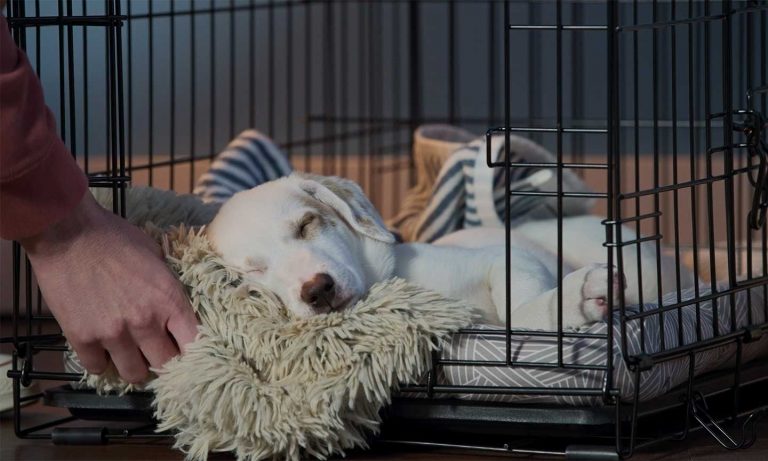Puppies are full of energy, curiosity and excitement, so when they start acting any differently it’s natural for pet parents to wonder whether their cute pup is feeling less than their best. Not only are sick days no fun, but they can also spiral into something worse—and may even become life-threatening if left unaddressed. Part of being a caring pet parent means learning how to know if your puppy is sick.
Ahead, we’re covering how to tell if your dog is sick (with common signs of illness to look out for), when it makes sense to get supportive care from a veterinarian, and how you can help a sick puppy at home.
In This Guide:
11 Signs of a Sick Puppy
Because their immune system isn’t fully developed, young puppies tend to be more at risk for certain bacterial infections and viral infections like parvovirus, kennel cough, distemper and intestinal parasites.
“Every puppy should receive core vaccines, which typically include vaccinations against distemper, parvovirus, adenovirus and rabies,” notes Colleen Lambo, DVM, a Bryan, Texas–based veterinarian with the national, mobile, pet care service The Vets. “These vaccines protect against highly contagious and potentially deadly diseases that puppies are susceptible to.”
It’s also important to keep an eye out for potential health problems so you can ensure they’re cared for right away. Here are the signs of a sick puppy.
1. Lethargy
Whether your puppy is typically chipper and energetic or naturally more slow-going, it’s important to keep an eye out for any changes in their energy levels. If your puppy is lethargic, it could simply mean they’ve had a poor night’s sleep or really overdid it during playtime, but it could also be a sign of illness, particularly if paired with any of the symptoms noted below.
2. Behavioral Changes
Similarly, be on the lookout for overall behavior shifts in your puppy, which may indicate pain, discomfort, anxiety or an underlying health issue.
“Three main behavioral signs that your puppy is sick are a decrease in play, an increase in sleeping, and not wanting to get out of their bed or sleeping area,” says Amber Karwacki, DVM, a veterinarian with Heart + Paw in Philadelphia, Pennsylvania.
Some other behavior changes include reduced sociability, aggression, confusion or anything else that seems out of the ordinary for your pup.
3. Loss of Appetite
When a puppy’s health is off, they naturally have less of an appetite. If you notice that your pup isn’t eating the dog foods or treats they normally love, isn’t running to their food dish at mealtime per usual, or they’re not able to eat much of the food in front of them, these are all signs they’re not feeling well.
4. Weight Loss
Unexplained weight loss in a puppy is a cause for concern, as it often points to an underlying health issue. Weight loss can be a symptom of various conditions, not limited to parasites (such as heartworms or tapeworms), metabolic disorders, organ function issues and muscle atrophy due to prolonged inactivity.
5. Vomiting
Vomiting signals that your puppy either ingested something they shouldn’t have (and their body is trying to expel it) or that they’re dealing with a gastrointestinal infection or issue that’s causing an upset tummy, Dr. Karwacki notes.
Puppy vomiting is never considered normal.
6. Constipation
Your dog’s poop may seem like something you don’t want to think about, but this stinky stuff can tell you a lot about your dog’s health, says Dr. Karwacki. It’s important to track their typical pooping frequency and to actually examine their feces.
If they’ve stopped pooping altogether, this could signal a blockage or issue in their intestines or colon (perhaps from ingestion of a foreign object). If they’re pooping, but not as much—or they have small, hard feces and/or blood in their stool—this could point to dehydration or another issue.
7. Diarrhea
Puppy diarrhea is another key sign of illness you’ll want to address immediately. Dr. Karwacki says loose stool is commonly caused by a gastrointestinal illness.
Diarrhea is never considered “normal” in puppies and should be considered a warning sign. When left untreated, diarrhea can cause dehydration in pups and affect their nutrition and growth.
8. Change in Urination
A shift in your pup’s urination habits—such as increased frequency, straining or discolored urine—can indicate urinary tract infections, bladder stones, kidney problems or diabetes.
Keep an eye out for any signs of discomfort during urination, accidents in the house or changes in the color or odor of your puppy’s urine, and consult your veterinarian if you notice anything abnormal.
9. Respiratory Distress
Dogs are susceptible to respiratory diseases just like us, so keep an eye out for common symptoms. Dr. Karwacki says these include drippy discharge from their nose, coughing, sneezing or open-mouth breathing at rest (which indicates difficulty breathing).
10. Skin Lesions
Keep an eye out for any changes to your dog’s skin, including rashes, sores or lumps. These may indicate something minor—like a scratch that’s on the mend—or could be a sign of an infection, allergy or other health condition that should be addressed.
Common causes of skin lesions in puppies include mites, fleas, bacterial or fungal infections, allergic reactions and autoimmune diseases.
11. Neurological Issues
Signs of a neurological problem can show up in a diverse range of symptoms in puppies. Dr. Karwacki says the most common signs to look for include discharge from the eyes, thickened paw pads, circling, head tilt and seizures. If you notice any of these issues, it’s important to address them right away.
When To Take Your Sick Puppy To See a Vet
When a puppy shows any signs of illness, they should be seen by your veterinarian right away.
Some common puppy illnesses, such as parvo or canine influenza, can become severe in a short amount of time, which can require more in-depth treatment, Dr. Karwacki warns.
In other words, it’s important to get ahead of the illness to avoid severe cases and hospitalization. Taking your puppy to the vet right away can also help provide them some much-needed relief so they’re back to their playful selves.
How To Care for a Sick Puppy at Home
More about caring for your puppy:
Share:










